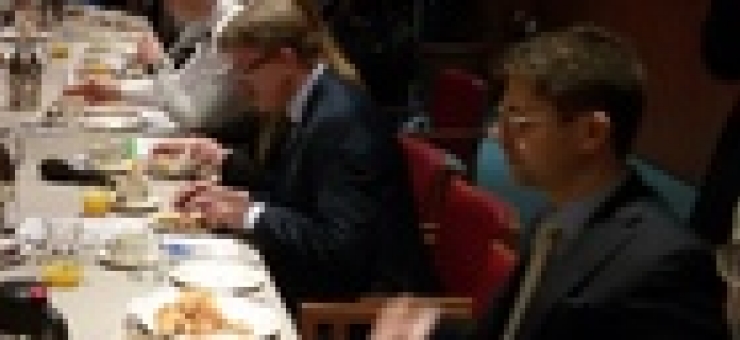EP Interest Group on Work-Life Balance Meets: Healthy work places in Europe, keys to preventing psychosocial risks

Tackling the rise in psychosocial diseases by ensuring a fair work-life balance, proper rest and a common work-free day must be a key element of the EU Strategic Framework on health and safety. That was the theme for the third meeting of European Sunday Alliance Interest Group on Work-Life balance that took place on 10 December under the patronage of Ms Evelyn Regner MEP (S&D) and Mr Thomas Mann MEP (EPP).
The theme was prompted by a 2015 European Parliament report indicating that work-related stress and psychosocial risks are responsible for almost half the number of working days lost each year. The report notes a proposal from the European Commission for an “EU Strategic Framework on Health and Safety at Work”. Host MEPs also named the intrusion of smart phones and social media, and ‘around-the-clock’ availability as growing problems for workers in Europe.
Laila Castaldo, UNI Europa and on behalf of the European Sunday Alliance, welcomed the initiative taken in the report and criticised the Commission’s attempt to classify the much needed health and safety standards as “needless and burdensome red tape”. Working in a healthy and safe environment is a fundamental human right, she argued.
Those gathered enjoyed a presentation from Brenda O’Brien from the European Agency for Safety and Health at Work (EU-OSHA), who discussed the implementation of the Strategic Framework, especially regarding psychosocial risks including stress, depression, and burnout. O’Brien also noted that absenteeism due to these risks is growing across Europe. They are now the number two reason workers are absent for more than three days. Recent data suggests that long working hours, an unbalanced relationship of work and outside life, precarious work, and poor work organisation are significant contributing factors. She referred to the outcomes of the EU-OSHA 2014–15 Campaign: Healthy Workplaces Manage Stress.[1]
Herman Fonck of the Christian Confederation of Trade Unions (ACV-CSC), chair of the Governing Board of Eurofound, presented on the importance of decent work in light of increasing psychosocial risks, and challenges emerging from growing pressure for retailers to open on Sundays. He emphasized that the studies about increasing psychosocial risks at work are well-known, but not taken seriously into account by policymakers. In this regard he also argued that the EU work programme 2016 does not give enough attention to health and safety issues. He shared interesting findings of the Eurofound 6th working conditions survey carried out on a sample of 35 765 interviews in EU 28. According to the survey over the period 2000 to 2015, there was a 32% increase of working on Sunday, 32% of workers worked more than 10 hours a day at least once a month, 45% workers have worked in their free time in order to meet work demands in the last 12 months, and 20% consider their working hours do not fit well or at all with their family or social commitments.[2]
Participants discussed how the Strategic Framework can support research about the relation of psychosocial risks and balancing work, family, and social life. They also were interested in the right to “switch-off”, the emergence of new risks, gender imbalances in unpaid work and care responsibilities, and how to improve the implementation of existing health and safety legislation.
The well-attended event included representation from religious organisations, trade unions, national Sunday Alliances, civil society, and the European Parliament.
The European Sunday Alliance is a network of national Sunday Alliances, trade unions, employers’ organisations, civil society organisations, churches and religious communities committed to raise awareness of the unique value of synchronised free time for our European societies.
[1] See: https://osha.europa.eu/en/healthy-workplaces-campaigns/healthy-workplace...
[2] See: http://www.eurofound.europa.eu/publications/resume/2015/working-conditio...

